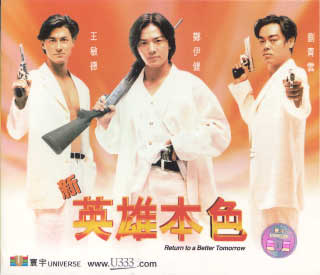
Reviewed by Jay Wassmer

Despite the title, this is not a sequel to the influential John Woo/Tsui Hark A Better Tomorrow series. This is director Wong Jing’s belated attempt at cashing in on said series. Long after the heroic bloodshed film had seen its heyday along comes Wong trying to revive it with some fresh young talent, namely Ekin Cheng and Lau Ching Wan along with the ever-present (at least in Wong Jing films) Chingmy Yau.
This movie can be seen as slightly important from an historical viewpoint, it certainly succeeded in helping nail the coffin shut on the heroic bloodshed cycle, and it also inadvertently went miles toward helping usher in the Young & Dangerous films that would follow. Wong Jing would later produce a few of the Young & Dangerous pictures including the first in the series (not to mention directing/producing a few subsequent knock-offs), while Ekin Cheng would make an even bigger name for himself as the star of that series.

Plot twists arise with the introduction
of Cheng’s boss (Ben Lam), a drunken and seemingly harmless guy making a
name for himself in the underworld by hiding in the shadow of his more successful
underling. If he’s not wooing girls he’s delivering embarrassingly bad karaoke
renditions of canto-pop tunes. But, Cheng being the Triad leader with a heart
of gold treats his big brother with the respect he’s due (even if the audience
can’t figure out why he’s due even that).

Cheng is placed under arrest and just as
things look really grim in swoops a bleach-blond psycho named Holland Boy
(Ngai Sing). Holland Boy lays waste to a bunch of police and frees Cheng,
who’s not too happy with Holland Boy’s lethal tactics. We find out that the
bleach-bond mystery man was sent by Cheng’s less than reliable boss to help
him escape and get him over the border to the mainland where he can hide
out till things blow over.
Time to cut ahead, Cheng joins Holland Boy on a less than spectacular
vacation in the mainland, just to discover that the dope-dealer is really
his boss and it’s elimination time. Okay, so the bottle-blond psycho was
sent to kill, quick solution jam a beer bottle in a very painful way down
his psychotic throat and make a break for it. I do have one question here;
Cheng told Lau to make sure the target is dead, so why not follow his own
advice? That said, obviously the bleach-blond psycho still lives. We cut
back to Hong Kong, where Holland Boy is back in time to help his leader torture
Cheng’s girlfriend played by Wong Jing regular Chingmy Yau.

Wong’s father is very upset and needs Lau’s help to get his son back. Cheng and Wong’s dad pay a visit to Lau. As soon as Lau sees Cheng a cheerful reunion ensues. Having established that Lau was not involved in Cheng’s down-fall, the two pledge their devotion to one another and decide to seek revenge on their drug dealing boss.

In a film like this, casting is as important as direction, and this is one misguided cast. Lau has proven to be a versatile and enjoyable actor in other films, but here he’s wooden and lifeless (a real shame). Michael Wong is always wooden and having seen him in a number of English speaking roles I no longer believe it’s the language barrier, the boy simply isn’t a very good actor. Cheng is always used as eye-candy for the ladies and sometimes he delivers a nugget of presence here, but his character is more a series of clichés than a real person. Appearing also are James Wong as Ekin’s lawyer and Parkman Wong as the fair-minded cop.

My rating for this film: 6.0